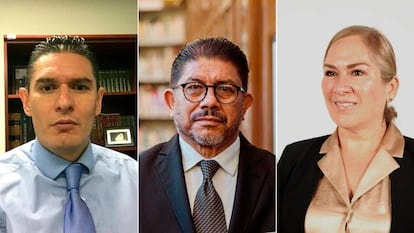A judge accused of abuse, the ‘terror prosecutor,’ and El Chapo’s lawyer: Candidates for the Mexico judicial election singled out by human rights organizations
Among the denounced candidates are former regional prosecutor Francisco Herrera Franco, linked to the murder of two journalists in Michoacán, and Silvia Delgado, part of the legal defense for the leader of the Sinaloa Cartel

The shortcomings of the judicial election evaluation committees continue to leave — at the very beginning of the campaign — a trail of candidates marked by controversial pasts. In a complete about-face, for example, Silvia Delgado has gone from being part of the legal defense team for Joaquín “El Chapo” Guzmán, leader of the Sinaloa Cartel, in 2016 to becoming a candidate for criminal justice judge in the state of Chihuahua. In a documentary made by the German broadcaster DW about lawyers for drug cartels in Mexico and Colombia, Delgado argues that the trial of the kingpin, sentenced to life in prison in the United States for at least 10 crimes, “was a farce.” “It was a tribute to Donald Trump, a tribute to the king [...] The law was violated in its fullest sense here,” she alleges, later concluding: “What Mr. Guzmán always asked for, because he told me so, was simply to be treated like the other inmates. He didn’t receive a fair trial.”
The judicial candidate, who has no prior experience in the judiciary, not only does not consider this background a conflict of interest with the position she aspires to hold, but rather believes it is a virtue. “All my clients are equally important; there was no need to single any out. However, this shows that I have the character and composure needed to judge,” she stated in a Facebook post in which she shared a note highlighting her relationship with El Chapo.
This is not the only high-risk candidacy that Defensorxs, a legal platform advocating for human rights, has observed in recent weeks. The civil organization has taken on the task of identifying unsuitable candidates to become magistrates or judges, who will be elected by popular vote for the first time in history on June 1. Their investigations continue to reveal the inclusion on the lists of individuals with controversial episodes in their backgrounds, at best, or with ties to organized crime at worst. This latter scenario includes the candidacy of Francisco Herrera Franco for district criminal judge in Michoacán, a former regional state prosecutor accused of alleged involvement in the murder of two journalists from the Monitor Michoacán website: Roberto Toledo, in January 2022, and Armando Linares, the outlet’s director, two months later. Both had received threats over their investigations into the prosecutor’s corruption.
A joint statement signed by eight organizations, including Article 19, denounces that Herrera Franco, nicknamed the “terror prosecutor,” has a history of “human rights violations, institutional co-optation, and alleged pacts with criminal groups.” The latter came to light most notably after the leak of a recording in which he is allegedly heard collaborating with an organized crime leader in the eastern part of the state, Edwin Rivera Padilla, known as “El Barbas.” Herrero Blanco has denied the accusations and also denied that he is the person heard in the audio. “They attributed the voice to me. We all know that these days any voice can be simulated. There is artificial intelligence that has been proven to be able to modify that voice. It’s not me,” he explained in an interview with W Radio last week.
The newspaper archives, however, continue to point the finger at the former prosecutor. In a video posted on Facebook and picked up by the press in 2021, a representative of the region’s Mazahua communities is seen accusing him of pressuring his community to join one of the cartels operating in the area. “We just learned that you are on the side of a cartel, and that you go so far as to instruct our people to join a faction. Mr. Prosecutor, assume your responsibility as a public official,” he says, adding a warning: “I hope that what happened to the people of Ayotzinapa doesn’t happen to us because we spoke out here. You can’t speak out anymore, because then the official who is supposed to protect you is the one who orders you to disappear. We tell you to your face: if you’re not going to work, resign.”
This is one of the cases that most concerns civil society organizations, as it not only involves a conflict of interest when making judicial decisions, but they also consider Herrero Blanco a danger to journalists and human rights defenders. In the statement, the organizations demand that the National Electoral Institute (INE) and the Electoral Tribunal review the candidacy and ask the Federal Attorney General’s Office and the National Human Rights Commission to take over investigations related to the murders of the two journalists. “We are not only upset but also concerned about the work we are doing. The authorities failed to do so, and now they are passing this work on to us, putting us at risk,” says Miguel Meza, founder of Defensorxs.
The underlying problem, experts have warned, lies in evaluation systems that were poorly designed from the outset and then irresponsibly executed. The only committee among the three branches of government that had clearer and more defined guidelines was the Judiciary, but after a back-and-forth that resulted in its work being halted by order of a Michoacán court, it was ultimately the Senate that replaced it in preparing its list, before the committee had even finished screening. The haste with which this was done and the lack of prior investigations continue to produce a trickle of cases that question the suitability of some candidates and cast doubt on the work of the committees.
“We have challenged these candidacies,” says Meza, “but the Electoral Tribunal said it was not the time. We interpret this as them simply following a political instruction not to invalidate the candidacies, because if they open that door, they will have to invalidate many more. It is no longer just a legal issue, but a political one, and that is why we want to take it to the president.”
Among the other controversial cases observed by the association, there are at least two involving sexual crimes. Francisco Martín Hernández Zaragoza, a candidate for circuit magistrate in criminal matters in Jalisco, was removed from his position as a state criminal judge in 2015 following a complaint of sexual abuse and harassment filed in 2013 by a judicial employee. The Federal Judicial Council initiated disciplinary proceedings based on the complaint, which included recorded evidence, and ultimately removed him from his position. However, he could now return to a similar office.
Something similar happened with Edgar Rodríguez Beiza, although for him the outcome was more fortunate. Like Hernández Zaragoza a candidate for criminal magistrate in Jalisco, in Beiza’s case for the First Circuit, the judge was accused of sexual abuse in 2017 by a student at the Center for Advanced Studies in Legal and Criminological Sciences. In 2018, he was charged, but in 2019, the victim granted him a pardon, closing the case without resolving the merits, according to the press archives.
A few years later, in 2023, the legal defense of rape victim Amarande Riojas requested the recusal of Rodríguez Beiza as the judge overseeing her case, as he had previously stated that he would not prosecute the accused, according to the victim’s testimony collected by Defensorxs. The incident also reached then-president Andrés Manuel López Obrador’s morning press conference, through a journalist who thanked former security minister Rosa Icela Rodríguez for her help with the case.
The latest findings add to nearly a dozen previously reported cases. There are at least four candidates linked to the Light of the World evangelical church, whose leader, Naasón Joaquín, has been convicted in the United States of child sexual abuse. Weeks earlier, the inclusion of other problematic candidates was discovered, such as the former coordinator of Sonora prisons, Nicollino Cangiamilla, with serious negligence on his record, or one of the lawyers linked to the defense of Miguel Ángel Treviño Morales, Z-40, the leader of Los Zetas who was recently extradited to the United States. Less than two months before the election, with nearly 900 judicial positions up for grabs and time running out to scrutinize each candidate, civil organizations remain vigilant.
Sign up for our weekly newsletter to get more English-language news coverage from EL PAÍS USA Edition
Tu suscripción se está usando en otro dispositivo
¿Quieres añadir otro usuario a tu suscripción?
Si continúas leyendo en este dispositivo, no se podrá leer en el otro.
FlechaTu suscripción se está usando en otro dispositivo y solo puedes acceder a EL PAÍS desde un dispositivo a la vez.
Si quieres compartir tu cuenta, cambia tu suscripción a la modalidad Premium, así podrás añadir otro usuario. Cada uno accederá con su propia cuenta de email, lo que os permitirá personalizar vuestra experiencia en EL PAÍS.
¿Tienes una suscripción de empresa? Accede aquí para contratar más cuentas.
En el caso de no saber quién está usando tu cuenta, te recomendamos cambiar tu contraseña aquí.
Si decides continuar compartiendo tu cuenta, este mensaje se mostrará en tu dispositivo y en el de la otra persona que está usando tu cuenta de forma indefinida, afectando a tu experiencia de lectura. Puedes consultar aquí los términos y condiciones de la suscripción digital.









































